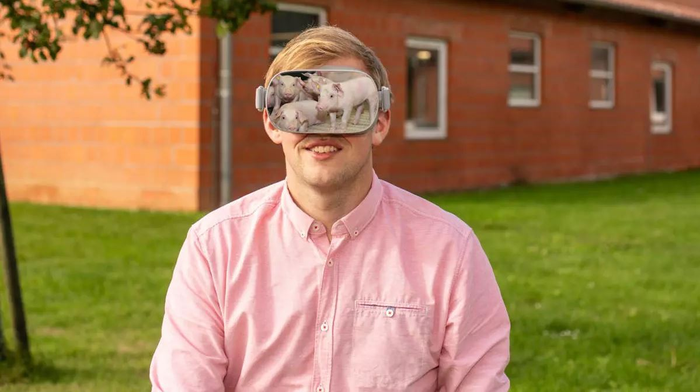Many people would like to see better animal welfare and transparency in livestock farming. In recent years, agriculture has increasingly tried to be more open, for example through farm tours. Even though farm tours are well received or appreciated by the public, they are not really feasible for the vast majority of people because of hygiene requirements or accessibility. As an innovative approach to overcome these limitations, researchers at the University of Göttingen were the first to investigate the perception and potential of virtual farm tours. The results were published in the scientific journal PLOS ONE.

Credit: Ludger Bütfering
Many people would like to see better animal welfare and transparency in livestock farming. In recent years, agriculture has increasingly tried to be more open, for example through farm tours. Even though farm tours are well received or appreciated by the public, they are not really feasible for the vast majority of people because of hygiene requirements or accessibility. As an innovative approach to overcome these limitations, researchers at the University of Göttingen were the first to investigate the perception and potential of virtual farm tours. The results were published in the scientific journal PLOS ONE.
A research group from the field of Marketing for Food and Agricultural Products recruited 17 students without agricultural backgrounds to participate in a qualitative study. After answering a short questionnaire, the participants watched a 360-degree video of a conventional pig fattening pen via a portable computer screen (tablet) and virtual reality glasses. They then reported back about their experiences via an interview.
The participants had a rather negative perception of the pig fattening pen as regards animal welfare. The perception depended on both the perspective and the media device. However, most of the participants perceived housing conditions more positively in comparison with the image they had in mind prior to the study. Nevertheless, they appreciated the opportunity to do a virtual farm tour. They found it to be a suitable tool to improve transparency and to convey information about housing conditions. They particularly appreciated the comfortable and entertaining information intake using both media devices. However, the virtual reality glasses, in particular, conveyed a very realistic impression and were seen as particularly entertaining, while the tablet was considered to be beneficial as it was easier to handle.
“Our results show that it is worthwhile to use and further investigate the potential of such innovative technologies. This might be especially useful when someone is just about to buy a product in a shop for instance. Thus, virtual farm tours could be a useful tool to clearly communicate what different housing systems really mean,” says Aurelia Schütz, first author of the study.
However, since participants asked for additional explanations about the stable, virtual farm tours should be supported by supplementary information.
Original publication: Schütz, A., Kurz K., Busch, G. (2022). Virtual farm tours—Virtual reality glasses and tablets are suitable tools to provide insights into pig husbandry. PLoS ONE 17(1): e0261248. doi: https://doi.org/10.1371/journal.pone.0261248
Contact:
Aurelia Schütz
University of Göttingen
Faculty of Agricultural Sciences – Marketing for Food and Agricultural Products
Platz der Göttinger Sieben 5, 37073 Göttingen
Email: [email protected]
www.uni-goettingen.de/en/591051.html
Journal
PLoS ONE
DOI
10.1371/journal.pone.0261248
Method of Research
Survey
Subject of Research
People
Article Title
Virtual farm tours—Virtual reality glasses and tablets are suitable tools to provide insights into pig husbandry.




